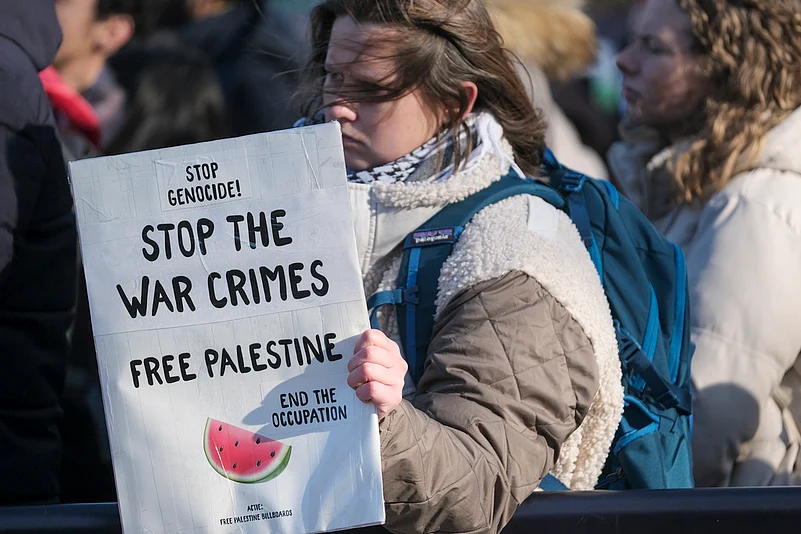In an interim ruling in South Africa's case against Israel for committing genocide in the Gaza Strip, the International Court of Justice (ICJ) on Friday rejected the Israeli request to throw out the case and issued a series of measures that Israel has to institute in Gaza.
South Africa has accused Israel of committing genocide against Palestinians in Gaza as part of its military campaign following the October 7 attacks by Hamas and allied armed groups. While the ICJ accepted South Africa's case for trial and issued provisional orders, it did not order a ceasefire in the region.
In the provisional orders, the ICJ has ruled that Israel must "take all measures within its power" to prevent genocidal acts in Gaza; prevent and punish the calls for genocidal acts; and enable humanitarian assistance in the region.
Here we explain what the ICJ ruled, what genocide means, what South Africa and Israel have argued in the court, and what's the road ahead in the case.
Prevent Genocide In Gaza, Enable Humanitarian Aid: ICJ To Israel
In its interim order, the ICJ directed Israel to prevent genocide in Gaza and prevent and punish any calls for genocide in Gaza while it decides the case before it.
The ICJ, however, did not order a ceasefire in Gaza as South Africa had sought. Moreover, it ordered Israel to enable humanitarian assistance in the region.
The ICJ issued a total of six provisional orders:
Israel shall "take all measures within its power to prevent" genocidal acts against Palestinians in Gaza.
Israel shall ensure "with immediate effect" that its military does not commit any genocidal acts in Gaza.
Israel shall "take all measures within its power" to prevent and punish the direct and public incitement of genocidal acts against Palestinians in Gaza.
Israel shall "take immediate and effective measures" to humanitarian assistance in Gaza.
Israel shall take effective measures to prevent the destruction and ensure the preservation of evidence related to allegations against it.
Israel shall submit a report to the ICJ on the implementation of these provisional orders within a month from the date of the interim ruling.
In the interim ruling, the ICJ noted that the court at the moment is not required to determine if the alleged genocidal acts have been committed or not. At the moment, the ruling said the court is concerned with the question of whether the allegations "appear to be capable of falling within the provisions of the Genocide Convention".
What's South Africa's Genocide Case Against Israel?
Last month, on December 29, South Africa filed a case of genocide against Israel regarding its military campaign in the Gaza Strip.
The oral arguments were held on January 11-12 in the case in which South African and Israeli governments put up their cases. Israel argued that the case should not be accepted for trial. In its interim ruling, the ICJ on Friday rejected the Israeli request and ordered a set of provisional orders.
In its case, South Africa alleged that Israel is committing acts of genocide against the Palestinians in Gaza as part of its military campaign. It said that the acts and omissions by Israel "are genocidal in character because they are intended to bring about the destruction of a substantial part of the Palestinian national, racial and ethnical group". It argued that what Israel is doing —military campaign— as well as what it's not doing —not exercising restraint among other omissions— together contribute to the alleged genocide.
In its case, South Africa sought an immediate ceasefire in Gaza. It also sought reparations from Israel for the reconstruction of Gazan infrastructure damaged in the months-long war.
After filing the case at the ICJ, South Africa said in a statement that it was obliged "to prevent genocide from occurring".
The statement further read: "South Africa is gravely concerned with the plight of civilians caught in the present Israeli attacks on the Gaza Strip due to the indiscriminate use of force and forcible removal of inhabitants...Furthermore, there are ongoing reports of international crimes, such as crimes against humanity and war crimes, being committed as well as reports that acts meeting the threshold of genocide or related crimes...have been and may still be committed in the context of the ongoing massacres in Gaza."
On its part, Israel challenged the position of South Africa to file the case at the ICJ and sought its rejection. It also rejected the allegation of genocide. Israel argued at the ICJ that its military campaign in Gaza was an exercise of self-defence in the wake of the attack by Hamas and allied groups on October 7. In the attack, several hundreds of Hamas militants invaded Israel by land, air, and sea in the cover of thousands of rockets and killed at least 1,200, injured 6,900, and took 240 as hostages, according to the Israeli authorities. The attackers are also accused of a wave of sexual violence against women.
Israel further said that a review of statements and formal orders of the Israeli government since the beginning of the campaign shows that there is no genocidal intent behind the campaign. The military campaign has been launched "with the intention to defend itself, to terminate the threats against it and to rescue the hostages", said Israel.
"Israel adds moreover that its practices of mitigating civilian harm and of facilitating humanitarian assistance demonstrate the absence of any genocidal intent. Israel asserts that any careful review of the official decisions in relation to the conflict in Gaza made by the relevant authorities in Israel since the outbreak of the war, in particular the decisions made by the Ministerial Committee on National Security Affairs and the War Cabinet, as well as by the Operations Directorate of the Israel Defense Forces, shows the emphasis placed on the need to avoid harm to civilians and to facilitate humanitarian aid. In its view, it is thus clearly demonstrated that such decisions lacked genocidal intent," the ICJ's order quoted Israel as saying.
What Does Genocide Mean?
The term 'genocide' is rooted in World War II when Nazi Germany killed around 6 million Jews in what's called the 'Holocaust'. It was coined by Polish lawyer Raphäel Lemkin in 1944. The term consists of the Greek prefix 'genos', meaning a race or tribe and the Latin suffix 'cide' which means killing.
The subsequent 'Convention on the Prevention and Punishment of the Crime of Genocide' (1948), better known as the Genocide Convention, institutionalised the definition. It defined genocide or genocidal acts as "acts committed with intent to destroy, in whole or in part, a national, ethnical, racial or religious group".
The definition sets a high bar for genocide as it refers to the intent of the destruction of a community and not just mass killings or massacres in wars and conflicts that fall in the ambit of war crimes or crimes against humanity but not necessarily genocide.
Omer Bartov, an expert on genocide, noted in The New York Times that he considers that war crimes or crimes against humanity are "very likely" taking place in Gaza but he does not see a case for genocide. He, however, also notes that the extremist rhetoric in Israel, including from its leaders, has the potential of reflecting genocidal intent and translating into genocidal action at some point.
In its defence, Israel has argued that it does not have the intent to systematically destroy the Palestinian people and that its war is against Hamas, a group it and several countries, such as the United States, have designed as a terrorist organisation. It has also argued that, in fact, Israelis are the target of genocidal campaigns of Hamas and allied groups like Hezbollah, both of whom are supported by Iran. To be sure, both Hamas and Hezbollah are committed to the destruction of Israel and Israel's archenemy Iran has since the Islamic Revolution of 1979 maintained it is a "cancerous tumour in the West Asian region that has to be removed and eradicated".
Israel being the target of Iranian conspiracies is, however, not a defence for its alleged actions in Gaza. In the ongoing conflict, Israel is accused of indiscriminate bombing of Gaza that has devasted the region and displaced the vast majority of its population. It has also been charged of indiscriminately mounting attacks that have overwhelmingly targeted civilians, women and children being the main victims. Since the beginning of the Israeli war on Gaza, more than 26,000 Palestinians have been killed in Israeli attacks and over 64,000 have been injured, according to Gaza's Hamas-controlled Health Ministry.
Raz Segal, the Program Director of Genocide Studies at Stockton University, told Time magazine that Israeli actions are a "textbook case of genocide". He said the Israeli military is carrying out three genocidal acts of "killing, causing serious bodily harm, and measures calculated to bring about the destruction of the group". He further quoted a speech of Israeli President Issac Herzog and said that the conflation of Palestinians as "an enemy population" and the explicit Israeli commitment to destroying all enemies could help prove the genocidal intent.
The ICJ's ruling on Friday is only an interim order. The case of South Africa against Israel is expected to take years and is just getting started.
















